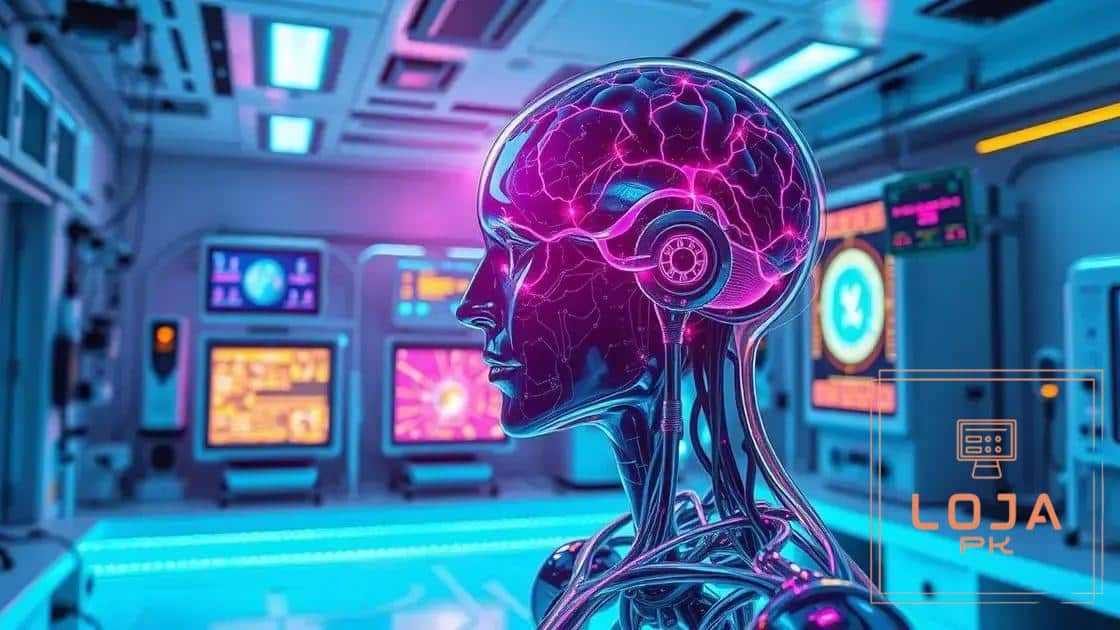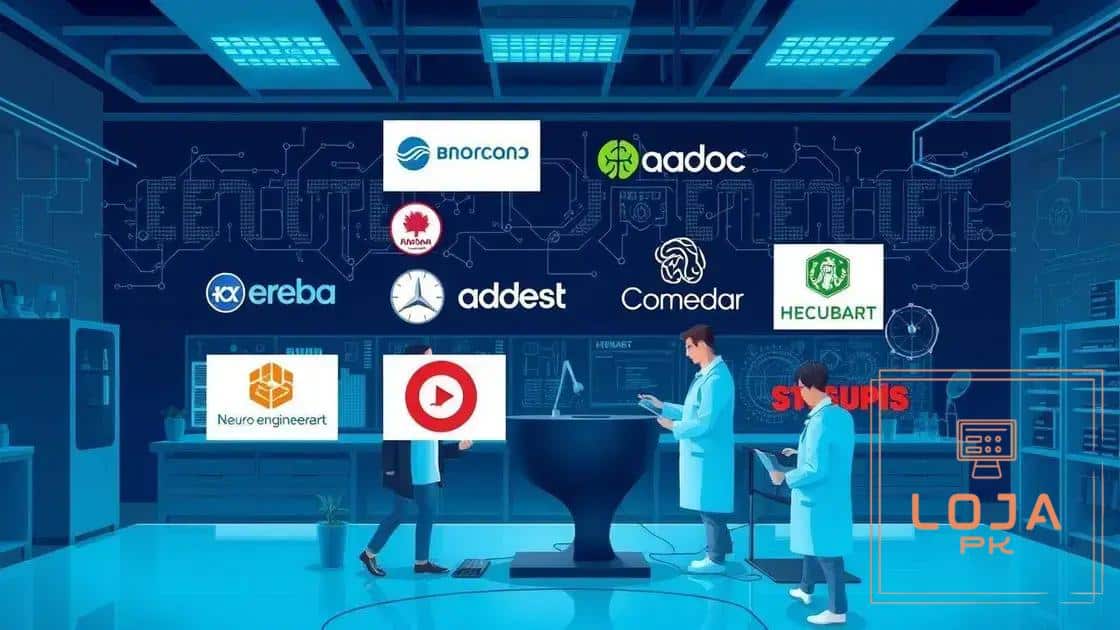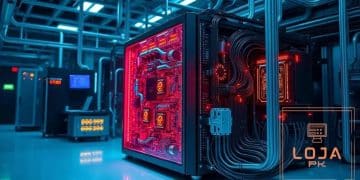Neurotech startups break new ground in 2025

Neurotech startups are transforming healthcare by integrating advanced technologies like brain-computer interfaces and personalized therapies, while facing challenges such as funding, regulatory hurdles, and ethical concerns.
Neurotech startups break new ground in 2025, merging technology with brain health in unprecedented ways. Have you ever wondered how these innovations can reshape our understanding of the mind? Let’s dive into the transformative world of neurotechnology.
Understanding neurotech and its potential
Understanding neurotechnology is vital as it shapes the future of how we interact with our brains and the world around us. This field blends neuroscience and technology, paving new paths in treating mental health and enhancing cognitive functions.
What is neurotechnology?
Neurotechnology refers to the tools and methods that allow us to observe and manipulate the nervous system. These innovations can help address various conditions, from neurological disorders to mental health issues.
Applications in healthcare
There are several groundbreaking applications of neurotechnology:
- Brain-computer interfaces: These devices enable direct communication between the brain and external technology, helping those with mobility impairments.
- Neuromodulation: Techniques like transcranial magnetic stimulation can treat depression and anxiety by altering brain activity.
- Neurofeedback: This approach allows individuals to see their brain activity, promoting self-regulation and improved mental states.
As we delve deeper into the workings of the brain, neurotech can unveil new methods to enhance cognitive capabilities. Imagine a world where individuals can boost their learning speeds or access memories at will!
The potential of neurotechnology is vast and still unfolding. Each breakthrough not only reveals new capabilities but also raises ethical questions about privacy and the extent of tech-human integration. Navigating these waters requires careful consideration of both the benefits and the risks.
Future possibilities
As research progresses, we look ahead to groundbreaking advancements. We may soon witness:
- Enhanced therapies for chronic pain and neurological disorders.
- Technologies that foster brain health and longevity.
- Innovations that redefine how we communicate and connect with each other.
Exploring neurotechnology leads to exciting prospects that could revolutionize not just healthcare but the very fabric of human experience. Embracing these advancements holds the key to a future where technology and humanity work hand in hand.
Key players in the 2025 neurotech landscape

In the evolving world of neurotechnology, several key players stand out as leaders shaping the industry in 2025. These companies and institutions are driving innovation, research, and application of neurotech solutions.
Leading companies in neurotechnology
Some notable companies making waves include:
- Neurable: Pioneering brain-computer interfaces that allow users to control devices with their thoughts.
- Paradromics: Focused on creating high data-rate brain-machine interfaces for therapeutic applications.
- Synchron: Known for developing minimally invasive neural interfaces to enhance brain function.
These companies are not only developing innovative products but also collaborating with research institutions to push the boundaries of what is possible in neurotech.
Research institutions
Universities and research institutions play a crucial role in advancing neurotechnology. Institutes such as MIT and Stanford are at the forefront of research, developing tools and therapies that impact real lives.
Partnerships between academia and industry are becoming increasingly common. By combining knowledge and resources, they can accelerate the development of new neurotechnologies. Initiatives like the Brain Initiative in the U.S. aim to map brain activity and improve the understanding of neural mechanisms.
As these key players continue to innovate, the landscape of neurotechnology will expand, leading to breakthroughs that could forever change healthcare and cognitive enhancement. The collaboration between startups, established firms, and research institutions creates a dynamic environment rich with possibilities.
Innovations transforming healthcare
Innovations in neurotechnology are transforming healthcare in remarkable ways, improving diagnosis and treatments. As we harness the power of the brain, we can address various health conditions more effectively.
Revolutionizing treatment methods
One key area of transformation is how we treat mental health. Neurotechnology tools like brain-computer interfaces and wearable devices help monitor brain activity in real time. This data can guide treatment plans tailored to individual needs.
Advancements in surgical procedures
Neurotechnology is also advancing surgical techniques. Minimally invasive procedures reduce recovery time and improve outcomes for patients with neurological disorders. Techniques such as stereotactic surgery allow for precise targeting of affected areas in the brain.
The use of neural implants is becoming more common in treating conditions like epilepsy and Parkinson’s disease. By stimulating specific brain regions, these devices can alleviate symptoms effectively. Other cutting-edge innovations include prosthetics that can be directly controlled by the brain, enabling those with mobility challenges to regain independence.
Enhanced diagnostics
Neuroimaging technologies are advancing rapidly. Techniques like functional MRI and EEG provide insights into brain activity, allowing healthcare providers to diagnose conditions earlier and more accurately. By understanding brain function, doctors can create personalized treatment strategies that align with a patient’s unique brain patterns.
As we explore these innovations, it’s clear that neurotechnology holds the key to unlocking new solutions in healthcare. Integration of these technologies will continue to redefine how we approach health and wellness, leading to a brighter future for patients around the world.
Challenges faced by neurotech startups

Neurotech startups are at the forefront of innovation, but they face numerous challenges in this rapidly evolving industry. Understanding these obstacles is crucial for their success and longevity.
Funding and investment hurdles
Securing funding is often a major challenge for neurotech startups. Investors are cautious due to the complexities and uncertainties associated with brain-related technologies. Startups must demonstrate the viability and potential of their products to attract investment.
Regulatory challenges
Another significant challenge lies in navigating the regulatory landscape. Neurotech products often require extensive testing and approvals from health authorities, which can delay market entry. Startups must stay updated with regulations that vary by region and adapt to ever-changing compliance requirements.
- Understanding FDA regulations: Startups need to have a deep understanding of the U.S. Food and Drug Administration’s guidelines for medical devices.
- Meeting international standards: For global reach, compliance with international regulations is also essential.
- Data protection laws: Addressing privacy concerns related to brain data is crucial for gaining user trust.
In addition to funding and regulations, the competition in the neurotech space is fierce. Numerous startups are vying for attention and market share, making it essential to stand out with unique offerings. Building partnerships, networking, and showcasing technological advantages can help in this aspect.
Public perception and ethical considerations
Public perception also plays a role in the challenges faced by neurotech startups. Ethical concerns regarding the use of brain data, potential misuse, and the implications of human enhancement often create skepticism. Education and awareness campaigns can help mitigate fears and promote understanding of the benefits of neurotechnology.
Balancing innovation with public acceptance is vital for the growth of the neurotech sector. By addressing these challenges head-on, startups can position themselves for success in a promising yet demanding industry.
Future trends in neurotechnology
The future of neurotechnology is bright, with many trends set to reshape how we understand and interact with the brain. As research progresses, innovations will emerge that enhance treatment options and improve cognitive functioning.
Advancements in brain-computer interfaces
One of the most exciting developments is in brain-computer interfaces (BCIs). These devices are becoming more sophisticated, enabling seamless communication between the brain and computers. Future BCIs may allow individuals to control devices using only their thoughts, providing unprecedented independence for those with mobility challenges.
Neurotechnology for mental health
Advancements in neurotechnology will also impact mental health treatments. Personalized therapies utilizing real-time brain imaging could help tailor interventions to individual patients, making treatments more effective. Wearable devices will monitor brain activity, providing feedback and suggesting adjustments to therapy in real time.
- AI integration: The incorporation of artificial intelligence might predict mental health crises by analyzing brain patterns.
- Digital therapy apps: Apps will use neurofeedback to help users manage stress and anxiety.
- Data-driven treatments: Future therapies will be more data-driven, enhancing their precision and effectiveness.
As neurotechnology advances, ethical considerations will also gain prominence. Discussions about data privacy and the implications of enhancing brain functions will become vital. Striking a balance between innovation and ethics is essential as we move forward.
Interdisciplinary collaborations
The future will see increased collaboration between neuroscientists, engineers, and healthcare professionals. This interdisciplinary approach will drive comprehensive solutions that bridge technological innovations with clinical needs. By working together, experts can effectively address complex health issues and create more accessible neurotech solutions.
With these trends shaping the landscape, neurotechnology is set to redefine our relationship with the brain. Embracing these advancements will not only enhance healthcare but also open new avenues for understanding human potential.
The exciting world of neurotechnology is evolving rapidly, impacting healthcare and our lives in profound ways. By understanding the ongoing trends and challenges, we can prepare for a future where brain health takes center stage. The collaboration between various disciplines will drive innovation, making advanced treatments more accessible. As we embrace these changes, it’s essential to address ethical concerns and maintain a focus on the benefits of neurotechnology. Together, we can unlock new possibilities for enhancing human potential and improving mental health.
FAQ – Frequently Asked Questions about Neurotechnology
What is neurotechnology?
Neurotechnology involves the tools and methods used to understand and manipulate the nervous system, often aiming to improve health and cognitive function.
How is neurotechnology transforming healthcare?
It enhances treatment options for mental health, enables brain-controlled devices, and improves diagnostics through advanced neuroimaging techniques.
What challenges do neurotech startups face?
They encounter funding issues, regulatory hurdles, fierce competition, and public skepticism regarding ethical implications.
What future trends can we expect in neurotechnology?
We can anticipate advancements in brain-computer interfaces, personalized therapies, and increased interdisciplinary collaboration within the field.





